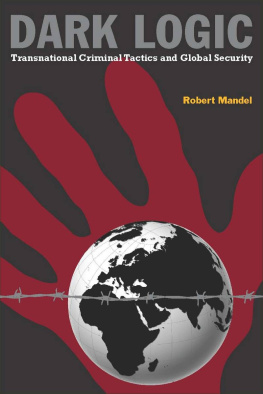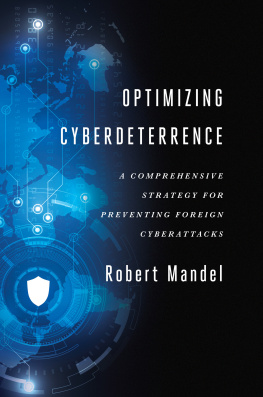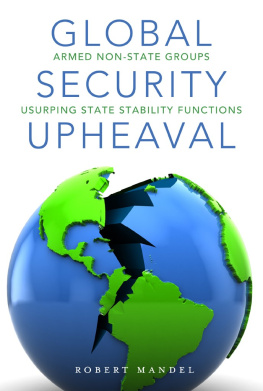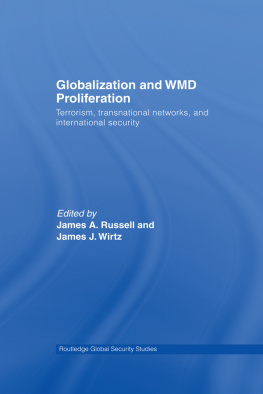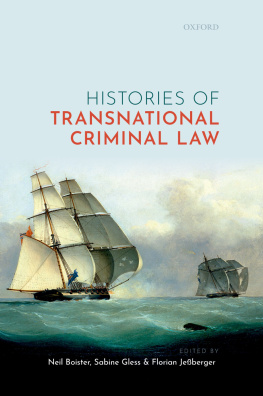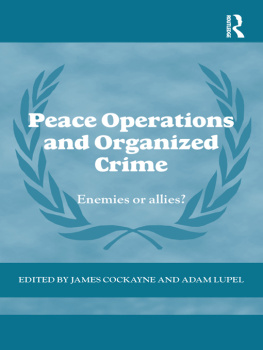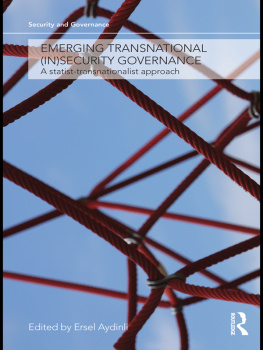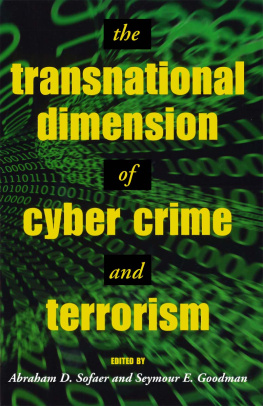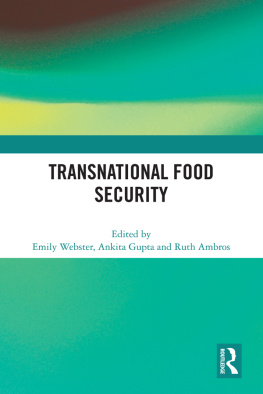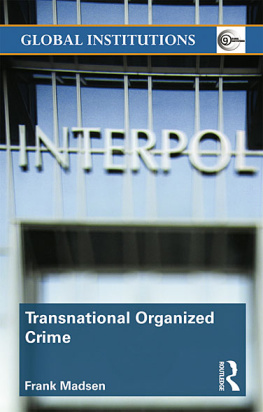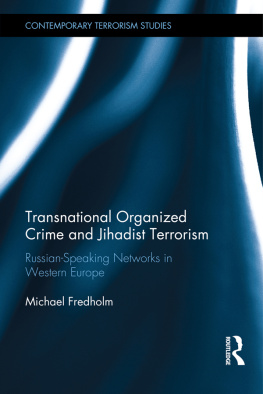Stanford University Press
Stanford, California
2011 by the Board of Trustees of the Leland Stanford Junior University. All rights reserved.
No part of this book may be reproduced or transmitted in any form or by any means, electronic or mechanical, including photocopying and recording, or in any information storage or retrieval system without the prior written permission of Stanford University Press.
Special discounts for bulk quantities of Stanford Security Studies are available to corporations, professional associations, and other organizations. For details and discount information, contact the special sales department of Stanford University Press.
Tel: (650) 736-1782, Fax: (650) 736-1784
Printed in the United States of America on acid-free, archival-quality paper
Library of Congress Cataloging-in-Publication Data
Mandel, Robert
Dark logic : transnational criminal tactics and global security / Robert Mandel.
p. cm.
Includes bibliographical references and index.
ISBN 978-0-8047-6992-1 (cloth : alk. paper) ISBN 978-0-8047-6993-8 (pbk. : alk. paper)
1. Transnational crime. 2. Organized crime. 3. Corruption. 4. Violence. 5. Security, International. I. Title.
HV6252.M36 2010
364.1'35dc22
2010021704
Typeset by Motto Publishing Services in 10/14 Minion
ISBN 978-0-8047-7677-6 (electronic)
ILLUSTRATIONS
Figures
Tables
ACKNOWLEDGMENTS
THIS STUDY OF TRANSNATIONAL ORGANIZED CRIMEmy tenth bookis the product of years of deep pondering. My continuing concern with postCold War global disorder has appeared in several articles and in five books published over the last decade: Deadly Transfers and the Global Playground: Transnational Security Threats in a Disorderly World (Praeger, 1999); Armies without States: The Privatization of Security (Lynne Rienner, 2002); Security, Strategy, and the Quest for Bloodless War (Lynne Rienner, 2004); The Meaning of Military Victory (Lynne Rienner, 2006); and Global Threat: Target-Centered Assessment and Management (Praeger Security International, 2008). Although appearing on the surface to be a quite narrow topic, in reality transnational organized crime is linked with today's most pressing global security concerns.
An investigation of this magnitude can rarely be executed successfully alone. I wish to thank my two undergraduate student research assistants, Lila Wade and Sarah Patterson, for considerable help with the case studies and for refinement of some of the general ideas. My conversations with Phil Williams at the University of Pittsburgh were invaluable, with Phil radiating the highly unusual combination of keen insight and kind encouragement. Beyond examining the published literature, numerous conversations with several colleagues in government intelligence and defense organizations have significantly contributed to my thinking, and they all deserve thanks. Finally, I wish to express special appreciation to Geoffrey Burn, the editor with whom I worked at Stanford University Presshis integrity, directness, enthusiasm, warmth, and humor made this publishing experience the best I have ever had so far. I also very much appreciated the considerable help from Jessica Walsh, his editorial assistant. I take full responsibility, however, for any egregious errors found in this volume.
This book is dedicated to global law enforcement and defense officials who endeavor to the best of their abilities to monitor, apprehend, and prosecute members of transnational criminal organizations. These officials toil without ceasing to comprehend, adjust to, and overcome the ever-changing challenges posed by these ruthless and unruly forces. The diligence and sincerity of effort among them should not be underestimated.
INTRODUCTION
The Central Question
SINCE THE END OF THE COLD WAR, transnational nonstate forces have been a major source of global instability, and many ominous disruptive flows of people, goods, and services have moved readily across international boundaries. Deflecting attention away from transnational organized crime as a primary facilitator of these critical disruptive flows was first the sense of euphoria associated with the fall of the Berlin Wall in 1989 and then later the focus on transnational terrorism triggered by the 9/11 terrorist attacks on the United States in 2001. Although some analysts go too far in claiming that currently the dimensions of global organized crime present a greater international security challenge than anything western democracies had to cope with during the Cold War, the transnational criminal threat is nonetheless highly insidious at a lower level. There is now a pivotal hole in our understanding of transnational criminals' decision making about the means to pursue their illicit ends and the security implications of these decisions.
This investigation begins to remedy this crucial analytical deficiency. Challenging puzzles requiring probing investigation surround the pervasive yet clandestine presence of transnational organized crime in the contemporary world, and focusing on these puzzles provides deeper insight into the nature of its operations and their consequences. So little is known about the modus operandi of transnational criminal organizations, and what little understanding does exist rarely distinguishes among their disruptive tactics or links these tactics to different kinds of security impacts. Consequently, an urgent need exists to explore within the contemporary international relations environment the dark logic behind transnational organized crime, its subtle fluid patterns, and the resulting interference with effective security protection.
Proper appraisal of the disruptive tactics, security impacts, and corrective responses pertaining to transnational organized crime involves considerable complexity. Indeed, upon closer scrutiny, many conventional assumptions about the causes, consequences, and cures of transnational criminal activities prove to be controversial, wrongheaded, or ill-advised. Disagreements abound among experts even about the most basic issue of whether transnational organized crime is worthy of security attention. Today many global political leaders possess conflicting conceptions and misunderstandings about how to gauge the elusive dangers involved, and, as a result, their policy responses have generally failed to achieve stated goals. This investigation's primary aim is to shed significant new light on the topic to create a more coherent and probing comprehension of the operational dynamics of transnational organized crime, the ways in which it disrupts security, the reasons for its success and the failure of attempts to constrain it, and some fresh ideas to help those responsible to grapple more successfully with this global threat.
THE NATURE OF THIS STUDY'S CENTRAL QUESTION
This study focuses on two particular issues: (1) when and how transnational criminal organizations choose corruption and violence tactics and (2) when and how transnational criminal activities generate individual/human and national/state security impacts. The specific central question is as follows:
Under what conditions is it most likely that transnational criminal organizations choose to rely primarily on corruption versus violence in their illicit cross-border transactions, and under what conditions is it most likely that transnational criminal activities primarily influence individual security versus state security?
This constitutes the first major study showing (1) when corruption and violence are most likely to be used, (2) when transnational criminal activities are most likely to affect individual security and state security, and (3) when the negative consequences of these tactics and activities can be most successfully combated. The presumed sequence is that first transnational criminal organizations select tactics to use in their activities, and then these activities generate security impacts, and discerning the criminal choice of tactics and their security impacts relies more on tangible observable behavior rather than elusive underlying motivations.

